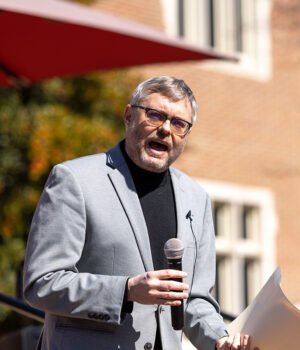Written by Mikaela Gantz
Dr. Willingham is an associate professor and chair of the history department at Roanoke College. He is a beloved, well-known, and extremely knowledgeable professor, which is why I reached out to him. The reason for this interview is because there seems to be a lot of misinformation on campus and in general about this war. I asked Dr. Willingham about terms and concepts that might not be understood well by the broad public.
The core problem of this war is that two separate entities are fighting for the same land; and both of these nations have legitimate historical claims to it. Dr. Willingham notes that the “history has been one of self-interested leadership, outside intervention, a succession of failures to seize the moral high ground, and a seemingly never ending series of moral atrocities.” To sum up that very academic sounding sentence, both nations have succeeded in making themselves look bad at times. They have both had the opportunity to take the moral high ground and they have never once taken it. Both sides have also committed serious moral atrocities; genocides and imprisonments, armed attacks, invasions of civilian areas, and other serious war crimes and morally unsound actions.
To give a brief overview of the region, paraphrased from what Dr. Willingham said, the Gaza Strip and Palestine are known as Palestinian territories. Both the Gaza strip and the West Bank were occupied by Israel until the 1990’s when the territories became united under Palestinian authority (PA). In the early 21st century there was a split between governance. The West Bank is now governed by the PLO (Palestinian Liberation Organization) and the Gaza Strip is governed by Hamas.
There have been some vast generalizations lumping Hamas in with the PLO or PA. I asked Dr. Willingham to separate these terms and explain the differences between them. Hamas is a radical Islamist terrorist group which has acted as the government of Gaza since the early 21st century. Hamas started the recent conflict by launching an attack on Israel. The PA is a quasi state allowed by various peace treaties which exercises some authority in the West Bank and it is controlled by the PLO which is essentially a political organization.
In this war, you cannot term one side anti-semitic and one side anti-islamic. It is simply not that simple. This rife between Israel and Palestine has been around since before any of us were born, including Dr. Willingham. It is a struggle between peoples, religions, races, and nations. It is incredibly complex, and to try and term it down to two words dilutes the seriousness of it.
In a similar way, Dr. Willingham says the term apartheid cannot be reasonably applied here. Apartheid is the former policy of the South African government referring to the separation of peoples based primarily on race. People of color were forced into ghettos and had no franchise or political rights. I asked him about his thoughts on this because I have seen people suggest that Israel is an Apartheid state. He says that while there is no doubt Israel is governing millions of people without their consent, applying this term here is misguided and it actually cheapens our understanding of the atrocity of both events.
Lastly I asked him about the way out and how the United States might play a role in it. He says that there is absolutely no military solution that will accomplish what needs to be accomplished. The solution is, thus, a political one. The United States plays a key role here in two ways. First, it is Israel’s constant ally and supporter, and it has clearly shown its continued support for Israel. Second, the United States is an ally that Israel trusts deeply, and thus has the best chance of persuading Israel to not fight violence with violence, to not retaliate in a manner that will only prolong the conflict. The United States has possibly the best chance at convincing Israeli authorities that a two state solution is not only rational… but the only option. This war will continue to be prolonged until the two state solution is reached, or a better solution comes along that equally benefits both parties, which is not very likely to occur.
Thank you to Dr. Willingham for allowing me to interview him, especially on such a controversial topic. He is a fantastic professor and I hope everyone gets the chance to have a class of his during their time at Roanoke.




